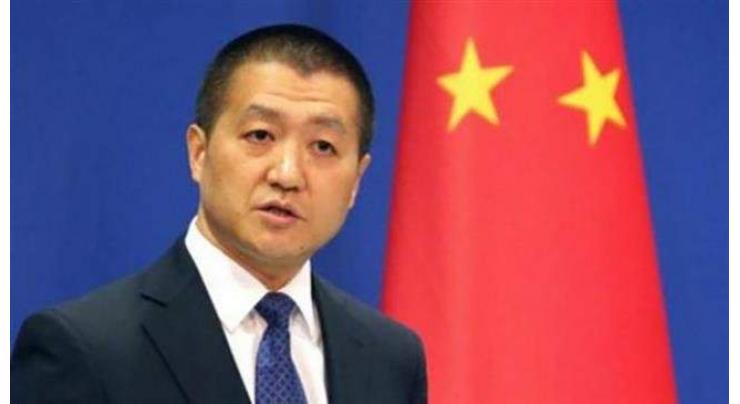
China Not Interested In Yuan Competitive Devaluation - Foreign Ministry
Fakhir Rizvi Published October 18, 2018 | 05:55 PM

China is not interested in competitive devaluation of its national currency, and does not intend to use the yuan exchange rate as a means of settling trade differences, the Chinese Foreign Ministry spokesman, Lu Kang, said on Thursday.
BEIJING (UrduPoint News / Sputnik - 18th October, 2018) China is not interested in competitive devaluation of its national currency, and does not intend to use the Yuan exchange rate as a means of settling trade differences, the Chinese Foreign Ministry spokesman, Lu Kang, said on Thursday.
US President Donald Trump has repeatedly accused China of competitive devaluation manipulating its national Currency in order to get trade preferences, namely, boost exports and cut imports. On Wednesday, the US Treasury Department released a report, not naming China as a currency manipulating nation, but still stipulating that the United States would closely monitor the Chinese financial policy and also investigate into the recent yuan exchange rate drop.
"We have paid attention to the related report. The conclusions, cited there, that China does not manipulate the currency rate are quite sensible, and they comply with the global community consensus.
As a responsible country, China has repeatedly said that we are not interested in the competitive devaluation of our national currency, and we will not use the yuan exchange rate as a weapon in trade differences settlement," Lu said at a press briefing.
He added that China intended to introduce a currency reform that would meet the market needs and maintain a stable and balanced yuan exchange rate.
"We hope that the United States will refrain from politicizing this issue," Lu said.
The yuan has dropped by nine percent against the US Dollar in the last six months.
This comes amid the ongoing US-China trade conflict that escalated in June when Trump announced that $50 billion worth of Chinese goods would be subject to 25 percent tariffs. Since then, the two countries have exchanged several rounds of trade duties against each other.
Recent Stories

HEC reviews curricula for environmental sciences degree programme

ICC Asia looking forward to an action-packed Asia Cricket Week

Yuvraj Singh named ICC Men’s T20 World Cup 2024 Ambassador

Greece hands Olympic flame to 2024 Paris Games hosts

Two Kyiv hospitals evacuating over feared Russian strikes

World must act on neurotech revolution, say experts

Charles & Catherine's cancer diagnoses

Champions Alcaraz and Sabalenka through in Madrid Open

King Charles to resume some public duties during cancer treatment: palace

US defense chief announces $6 bn in security aid for Ukraine

Heavy rains cause damage to Spezand-Taftan railway track

Woman stabbed in Israel, attacker killed: police
More Stories From Business
-

Finance minister reviews progress on FBR digitalization
8 hours ago -

US stocks rebound on tech earnings, London hits new record
8 hours ago -

US approves gene therapy treatment for hemophilia
8 hours ago -

KATI president for inclusion of agri sector in tax net
8 hours ago -

Ahsan chairs 13th CPEC-JCC preparatory meeting, reviews arrangements for high-level delegation’s v ..
10 hours ago -

Police to take every step for security of business community: IGP
10 hours ago
-

WB director, Planning minister discuss reforms in development projects
10 hours ago -

IP rights crucial in achieving SDG : Jam Kamal
11 hours ago -

FBR’s data protection efforts commended by OECD assessment team
11 hours ago -

US stocks rebound on tech earnings, London hits new record
12 hours ago -

SECP-IFSB workshop highlights Pakistan's progress in Islamic Finance Development
12 hours ago -

SBP to announce monetary policy on April 29
12 hours ago

















